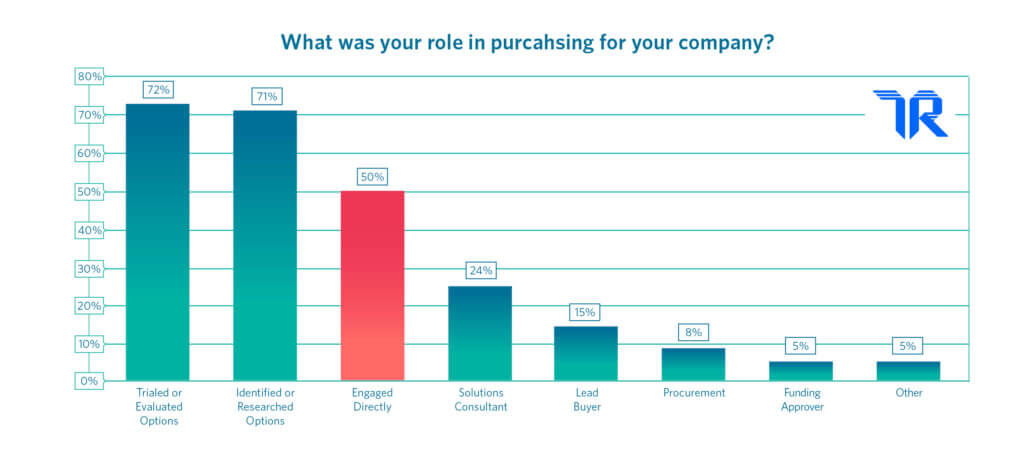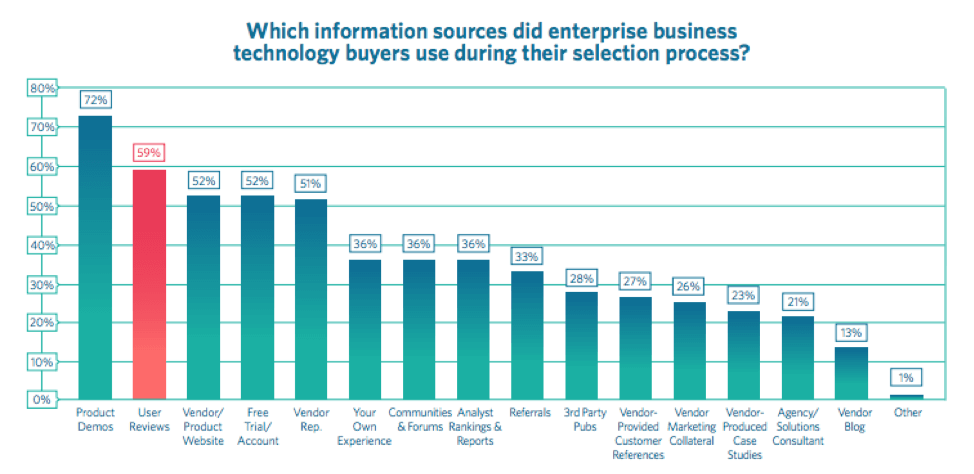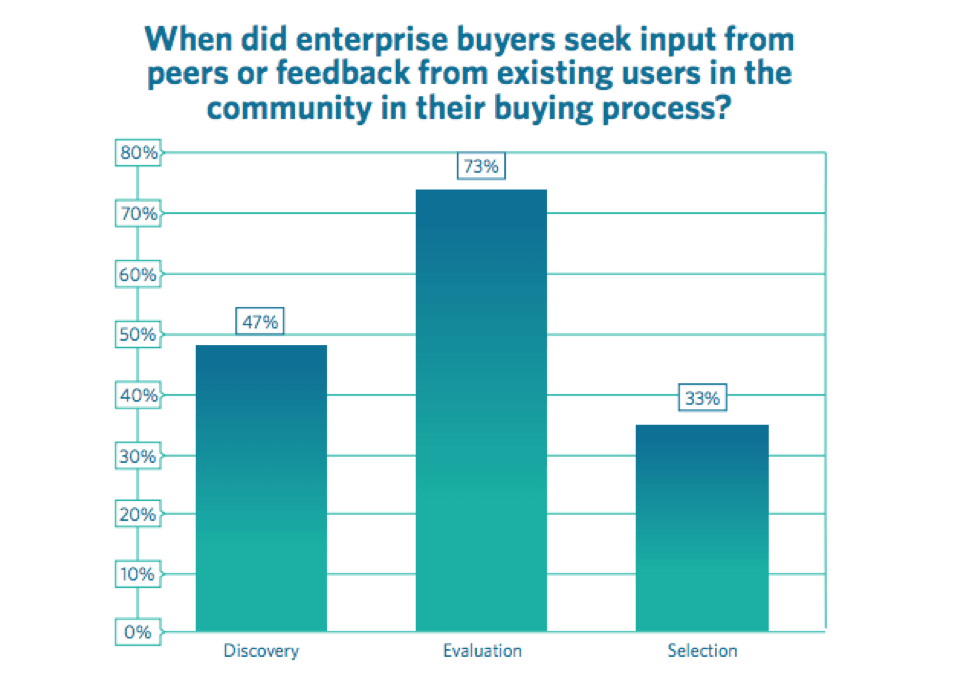50% of Enterprise B2B Tech Buyers Will Never Talk to You
There’s no question that B2B tech is difficult space to sell into. There’s a trust gap, for one. Buyers want vendors to be transparent. And when you’re pitching big sales decisions, often worth hundreds of thousands of dollars, that gap hurts.
Modern tools have both made the process easier and transformed what enterprise tech sales look like. But how has this transformation taken shape, exactly?
You probably aren’t using a fax machine as often, for starters. And marketing and sales are closer together than ever before.
But the way sales teams talk to potential buyers has changed as well. Consider these two facts:
- You most likely aren’t engaging with just one buyer.
- Half of those making the buying decision won’t even talk to you at all.
Read More: The Importance of Reviews to Enterprise Technology Buyers
If there’s one thing that doesn’t make B2B tech sales any easier, it’s that half of the people you need to sell to when speaking to enterprise companies are complete unknowns.
Shocking, right? According to our latest research on enterprise technology buyers (B2B buyers at companies of 1,001+ employees who were recently involved in a technology purchase), only 50% engaged directly with the vendor during the purchase process.
But there are a few things you can do to overcome this challenge.
Half of buyers won’t talk to you — so who is buying enterprise tech?
At first blush, it’s a confusing statistic: how is it possible that a large percentage of those buying technology never talk to a sales team before making a purchase?
The explanation has less to do with how buyers interact with vendors and more with how the enterprise sets up their purchasing decisions. In the past, and at smaller companies, tech procurement could be handled by one or two people. In today’s enterprise organizations, 99% of all business technology buying decisions are made by groups of 2 or more people.
Pulling information from our annual industry research around B2B buying decisions, TrustRadius surveyed enterprise technology buyers. These buyers were in a wide variety of positions, from C-level to Analyst, and departments, from Marketing to IT.
Technology buying is not solely an IT decision or solely an executive decision. More often than not, the decision falls to a buying committee, with a median size of 8 people.
Let’s break it down even further.
We asked B2B buyers what their role in purchasing technology was, from approving funding to actively evaluating options. Here are the most critical takeaways:
- These B2B buyers wear many different hats — most both research and trial options throughout the purchase process.
- About 15 percent are the lead buyers, which is about what we’d expect with what we know about buying group size.
- Over 70 percent are involved in the initial research and comparison process, as well as engaging with trial and evaluation of the product.
- Finally, just 50 percent are part of the direction conversation with a vendor. This is where our statistic comes from: 50 percent involved in the buying decision do not have this direct conversation.
If you’re a vendor sales rep, that means half of the people making the decision will never talk to you. And from the roles described above, they still have a very active position in a buying decision.
So just what is it that they’re judging you by?
In-depth reviews are a growing resource for B2B tech buyers
Just because you aren’t able to talk to half of your B2B audience making a purchase decision doesn’t mean you can’t communicate with them.
There are plenty of other resources that buyers can use to evaluate vendors — free trials and user reviews are chief among them. We asked these tech buyers directly which information sources they use during the selection process.
Outside talking to vendor reps and getting product demos, buyers are using what is available to them: research and trials. Of the two, research in the form of user reviews, online forums, third party publications seems to be the more popular option.
Reviews are now the #1 most-used resource buyers can access without contacting a vendor representative.
We asked B2B tech buyers why some resources were more helpful than others in making their buying decision. One marketing director was particularly blunt:
“Can’t trust the vendor, ever.”
Another VP in the IT Department told us why third party reviews are helpful:
“They seemed independent, we studied how current users fared and how they reported their complaints and needs were handled.”
An HR consultant spoke to why product trials work well:
“From the vendor side there are ways to make a product look great. When you’re actually getting to use them yourself and can see exactly what you want or how you can make customizations you really start to be able to pull the pieces together.”
In other words: B2B buyers use reviews not only when they aren’t able to engage directly with vendor representatives, but also because they see them as highly valuable to their decision process. The same can be said of free trial accounts; both give real insight into how a product works and how it can work for the buyer.
The use of reviews during the selection process has grown 13 percent when compared to 2018.
Enterprise tech buyers use reviews at every stage of the buying process, but there is a heavy emphasis on peer insight during the evaluation stage.
During this stage in particular, an enterprise buyer will look for ‘enterprise grade’ reviews rather than short, anonymous snippets. Buyers are looking for both honesty and depth.
Get proactive with the changing dynamics of B2B tech sales
It may seem that this is a reality completely outside the control of B2B sales teams: third-party reviews are independent and you can’t convince someone you don’t talk to, the thinking goes.
But that isn’t the case.
What can vendors do to get the people they aren’t talking to on their side and ready to purchase?
Be part of the conversation
Be part of the conversation by claiming your TrustRadius profile. Reviews are independent, but they can also be enormously helpful in guiding your sales, marketing and product development.
Being part of the conversation does not mean controlling review content. It means listening, and adjusting your own product and services when necessary.
It also means you’ll have a better sense of which elements (both highlights and limitations) to incorporate into your marketing and sales materials.
Bring reviews to buyers
Enterprise software buyers need social proof as they move forward with technology decisions. They will seek out reviews whether you want them to or not.
So why get a step ahead by bringing third party reviews to the table in the first place?
Incorporate reviews into your marketing campaigns for increased engagement, higher conversions, and accelerated sales cycles.
Enable your sales team
A prepared sales team comes into sales calls and product demos armed with marketing collateral like case studies and one-pagers. But B2B buyers are often left with the feeling that something is missing.
Since buyers are already using reviews in both the evaluation and selection phase, provide your sales team with honest and in-depth reviews from a wide range of enterprise personas.
Focus on quality over quantity
Our buying disconnect report already shows that organic, earnest content beats sales copy for B2B tech.
Remember that, today more than ever, quality matters more than quantity. With in-depth, enterprise-grade reviews you can engage potential customers without ever speaking a word to them. A sales team with highly relevant reviews will be much better equipped to speak with buyer committee members.
And a complete review profile may be one of the best sales weapons in your arsenal today.







